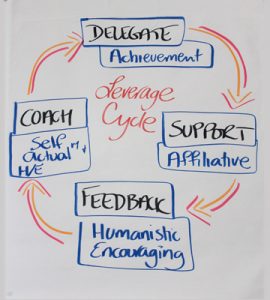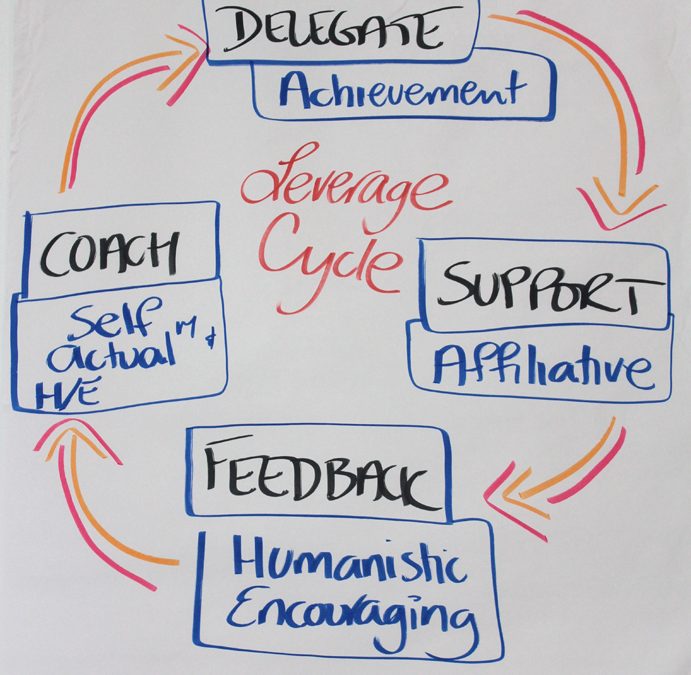 “Leverage is all about the power of using less to create more.” When it comes to mechanical things we understand this – think of a flat tyre, you don’t try to lift the car and put the new tyre on using just your energy and muscles, you use the jack – a very small mechanical device! So how does this relate to leadership, you might ask? Simple – it means it takes less of you as the leader to create increased production from others working in your team and the business receives the benefit of more from the same level of resources. People’s potential is not being realised, they are not fully engaged and not producing what they could be capable of doing.
“Leverage is all about the power of using less to create more.” When it comes to mechanical things we understand this – think of a flat tyre, you don’t try to lift the car and put the new tyre on using just your energy and muscles, you use the jack – a very small mechanical device! So how does this relate to leadership, you might ask? Simple – it means it takes less of you as the leader to create increased production from others working in your team and the business receives the benefit of more from the same level of resources. People’s potential is not being realised, they are not fully engaged and not producing what they could be capable of doing.
Leaders are increasingly bowing under the pressures of VUCA (Volatility, Uncertainty, Complexity, Ambiguity) and the demands of customers. Not to mention those pesky shareholders/business owners who want better returns on their investments; or the current business and society focus on Net Promoter Scores and People Engagement Scores – driving cultural and brand outcomes.Too many leaders continue to work long hours DOING far too much themselves.
Believe it – this pressure can be alleviated through leverage – using the skills, energy, potential and intrinsic motivation of every person in the team/organisation.
Look up leverage in the Business Directory and it says:
“The ability to influence a system, or an environment, in a way that multiplies the outcomes of one’s efforts without a corresponding increase in the consumption of resources.”
Instead of continuing to bow to the pressure and becoming lesser versions of themselves we highly recommend leaders build the confidence, conviction and courage to engage in the Four Leverage Cycle Conversations with each individual in their team. The greater the velocity and the veracity of these conversations, the greater the impact on quality and quantity of deliverables. The more potential to realise business growth, the greater the impact on the development of people and ultimately greater piece of mind and self actualisation for each leader:
Delegation
At the very core of this leveraging activity is the trust and the discipline to engage in delegation conversations. This brings a very strong task focus on what needs to be achieved and how it needs to be achieved. This is a highly disciplined conversation that requires thought before engaging in it.
Support
Far too few leaders invest the time and emotional energy into engaging in these conversations authentically. The result when undertaken effectively is people feel significant, they feel like they belong and they are aligned to the purpose. Align these conversations with the milestone check in conversations arising when you delegate and you create success for everyone. At their very essence these conversations demonstrate the care you have for your people who turn up to give of their best in the workplace each day.
Feedback
Be real, give and receive it frequently and bring an attitude of seeing feedback as a gift. Don’t fear it, embrace it and importantly give it with courage and receive it with curiosity. It is important that leaders recognise feedback conversations bring awareness, they do not bring acceptance or action. For things to change people need to accept the feedback and develop the intrinsic motivation to want to change. These conversations demand emotional intelligence from leaders and cannot be done on the fly or in a rush with a preoccupied mind.
Coach
Once feedback has been accepted, and the person who received the feedback is ready to take action and change the way they do things, it is the leader’s role to facilitate the thinking of this other person so they find their own solutions.
When leaders build the courage and skills to effectively use these Four Leverage Cycle conversations, the greater the impact on business growth and people development for the organisation.









